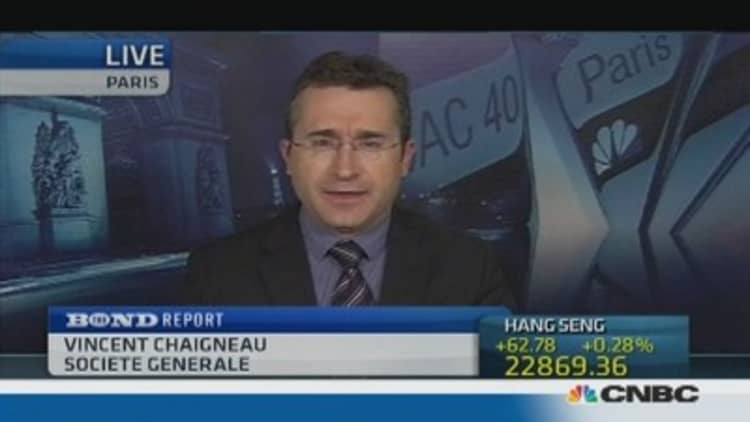There is no reason for the European Central Bank to intervene and weaken the euro's exchange rate, which is weighing on some euro zone economies, ECB Governing Council member Ewald Nowotny told news agency MNI on Tuesday.
The stronger , which has climbed more than 8 percent against the dollar since early July, is complicating the ECB's policy puzzle and Governing Council members are at odds over how to respond.
(Read more: Euro zone not yet fixed: JPMorgan's Dimon)
The euro rose close to an intra-day high after Nowotny's comments in the interview, in which he also said the impact of another interest rate cut would be limited. There was, however, room for manoeuvre in terms of liquidity provision.
"Of course we do not welcome the appreciation, and I'm also aware that the strengthening of the euro has an especially negative impact on the weaker economies and might therefore increase the economic divergence," Nowotny said.

"But I do not see any instruments we could use against it, and I also don't see that the problem has reached a dimension requiring a response. So we have to live with it."
The euro hit its highest level since November 2011 last week. Its appreciation is largely driven by the dollar's weakness as markets now expect the U.S. Federal Reserve to delay unwinding its bond-buying stimulus until next year.
"I have to say that up to now, we are still at levels of the dollar-euro exchange rate we have been at before, so this is not something extraordinary and I would not see a reason for an immediate reaction," Nowotny said.
(Read more: Why the euro area remains a good investment bet)
Euro zone inflation - currently at 1.1 percent and well below the ECB's target of just under 2 percent - is "a concern", Nowotny said. Be he added that inflation expectations were anchored and the recovery was "getting stronger".
The ECB policy rate of 0.5 percent was "acceptable for all European countries", he said, noting that the possibilities for monetary policy were very limited, especially with regard to interest rates.
"I do not think that having a negative deposit rate is a realistic perspective, but I also do not see a realistic perspective of lowering the main policy rate," Nowotny said.
"Where there is room for discussion is with regard to liquidity provision. There I see room for manoeuvre. But not with interest rates."
(Read more: Why we like European currencies right now: Goldman)
Nowotny said there was "big consensus" within the Governing Council that an abrupt termination of the ECB's three-year crisis loans needed to be avoided, but how exactly was still under discussion.
The ECB flooded the banking system with more than 1 trillion euros in two tranches of so-called long-term refinancing operations (LTROs) in late 2011 and early 2012, and there is concern that their expiry could disrupt the market.
Nowotny said there were "other instruments available to provide liquidity", apart from launching another LTRO.
(Read more: Is the euro the next currency battleground?)
"It makes sense to have some medium-term instruments available. And it would make sense also to give adequate signals to the markets."

